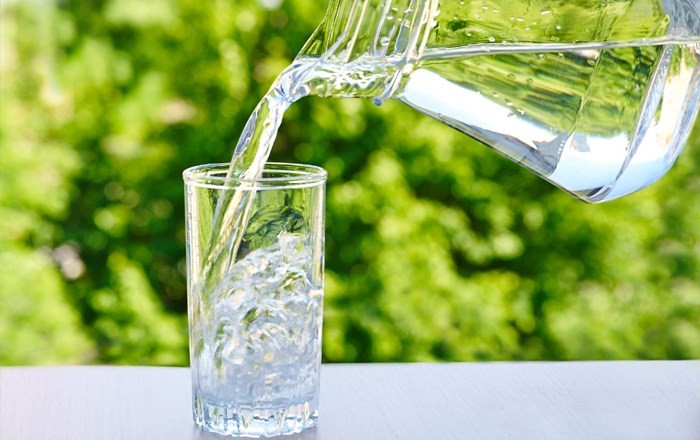During hot seasons, our bodies lose a significant amount of water, making hydration crucial. While drinking water may seem simple, drinking it correctly to safeguard your health is something not everyone pays attention to.
Water accounts for approximately 70% of our body weight, essential for life as it participates in numerous vital functions of the body. Firstly, water acts as a living solvent, facilitating continuous chemical reactions and metabolic processes within the body.
Water dissolves minerals and nutrients, aiding their absorption to support bodily functions. The body's metabolic processes produce excess substances and toxins. Water assists the liver and kidneys in excreting waste and detoxifying.
Additionally, water helps regulate body temperature through sweating. It also serves various purposes such as maintaining normal intestinal function, aiding food movement through the digestive tract, lubricating joints, and preserving skin health.
How much water should you drink?
Under normal conditions, the body requires an average of 2 liters of water per day. The need for water increases significantly during hot days, physical exertion, exercise, fever, or breastfeeding compared to normal days. Therefore, depending on health status and activity level, each individual needs to drink an appropriate amount of water daily to ensure adequate hydration.

7 Proper Hydration Practices
-
Drink slowly, in small sips, aiming for no more than 150-200ml per serving. Avoiding excessive water intake at once prevents rapid absorption, diluting the blood, and causing the body to excrete water, leading to the loss of essential minerals.
-
Consume more water in the morning and gradually reduce intake towards the evening; refrain from drinking large amounts before bedtime to prevent sleep disturbances. Morning is the optimal time for hydration; after a long sleep, the body becomes dehydrated, making a glass of water an excellent solution to replenish fluids and detoxify the body.
-
Drink enough water regularly rather than waiting until you feel thirsty, as by the time you feel thirsty, your body has already lost about 2-5% of its water. Proper hydration involves evenly distributing water intake throughout the day to ensure the body remains adequately hydrated.
Types of water to consume and avoid:
3 types of water to drink: Boiled water; Herbal teas for cooling: artichoke tea, corn silk tea, bamboo leaf tea, chamomile tea, green tea, etc.; Fresh fruit juices.
Types of water to limit consumption: Boxed fruit juices, carbonated beverages, tea, coffee, alcoholic beverages, energy drinks. While these beverages may be refreshing, they contain high levels of acidity and sugar, which can be harmful to the stomach, negatively affect tooth enamel, and increase the risk of obesity.
Caffeine in tea and coffee increases calcium excretion in the body, leading to dehydration and an increased risk of kidney stones. Energy drinks can cause dizziness, increased blood pressure, dehydration, and stomach issues.
-
Avoid drinking water that is too cold or too hot; water at temperatures between 15-30°C is ideal. Drinking very cold water can cause the blood vessels in the stomach and intestines to constrict, leading to reduced intestinal and gastric function, resulting in abdominal pain and even diarrhea. Excessively hot water can damage the esophageal mucosa, posing long-term health risks.
-
Avoid reheating water multiple times, as repeated boiling can cause sedimentation of heavy metals present in the water, which may accumulate in the body.
-
Drink water before engaging in physical activity or sports to ensure the body has sufficient reserves, preventing fatigue and dehydration during exercise. During physical activity, drink water regularly without waiting to feel thirsty. Afterward, take a 10-minute break before drinking water to allow the body to return to its normal resting state, as drinking excessive water while the body is still in an active state increases pressure on the heart and affects other organs.
-
Avoid drinking excessive amounts of water. When the body receives too much water, the kidneys may not be able to cope, resulting in dilution of minerals in the blood, causing fatigue, and in severe cases, fainting.
References: Ministry of Health, suckhoedoisong.vn
HY - Ho Chi Minh City Center for Disease Control (HCDC)
Detailed Information: https://ctsv.uit.edu.vn/bai-viet/ban-da-uong-nuoc-dung-cach-chua
Hạ Băng - Media Collaborator, University of Information Technology
English version: Phan Huy Hoang







